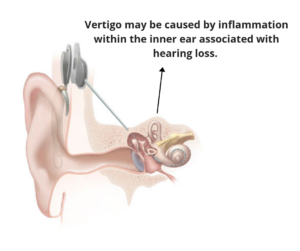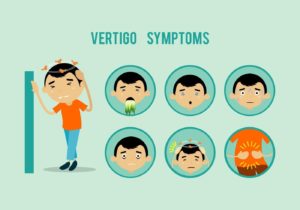Do You Have Vertigo?
Vertigo is one of the most misinterpreted neurological diseases. While being categorized as a disease, vertigo is often a symptom of deeper neurological conditions.
What is Vertigo?
Before we tell you what it is, let’s do away with the most common misconception; it is not a fear of heights.
Vertigo is a sensation of feeling off balance; a sensation of spinning dizziness. If you have these dizzy spells, you might feel like you or the world around you is spinning. Vertigo is medically different from dizziness, lightheadedness, and unsteadiness; it involves the sensation of movement.
What Causes Vertigo?

The inner ear consists of a collection of semicircular canals that are positioned at right angles to each other. These are lined with sensitive cells that act like a gyroscope for the body. This arrangement, along with the sensitivity of the hair cells within the canals, provides the brain instantaneous feedback regarding our position in space. A range of diseases that affect the positioning of these canals or the hair cells of the inner ear often causes vertigo.
Apart from this, there are other causes like head injury, migraine, acoustic neuroma, stroke etc. that can induce vertigo.
Depending on the source of the cause there are two types of vertigo;
- Peripheral vertigo occurs when there is a disturbance in the balance organs of the inner ear.
- Central vertigo occurs as the result of a disturbance in one or more parts of the brain, known as sensory nerve pathways.
What are the Symptoms of Vertigo?
Symptoms of vertigo vary from person to person and can range from mild to severe, depending on what’s causing the issue.
Signs and symptoms of peripheral vertigo:
- Dizziness
- Feeling like you’re moving or spinning
- Problems focusing the eyes

- Hearing loss in one ear
- Balance problems
- Ringing in the ears
- Sweating
- Nausea or vomiting
Some of the signs and symptoms of central vertigo:
- Double vision
- Difficulty swallowing
- Facial paralysis
- Eye movement difficulties
- Slurred speech
- Weak limbs
If you are experiencing any of these symptoms periodically for more than one week or have any type of dizziness that interferes with your daily activities, you should consult a general physician.
Many different medical conditions can lead to vertigo. The general physician can recommend tests to help you figure out what’s causing your symptoms. Sometimes, this process can take a while. A primary care doctor may be able to diagnose the cause of your vertigo. In fact, for most patients vertigo is primarily managed by their general practitioner. In certain cases you may also be referred to a specialist, such as an otolaryngologist or a neurologist, to help diagnose or treat the condition.
What are the treatment paths available for Vertigo?
Treatment for vertigo varies based on what’s causing it. In many cases, vertigo can go away without any treatment. This is because the brain is able to adapt, at least in part, to the inner ear changes, relying on other mechanisms to maintain balance.
For some, cases treatment is needed and they may include:
- Vestibular rehabilitation – A physical therapy that is aimed at strengthening the vestibular system (this is the system that sends signals to the brain about body movements relative to gravity and helps to keep your balance)
- Canalith repositioning manoeuvres – This is a kind of physiotherapy that recommends a series of head and body movements that help move the calcium deposits out of the canal into an inner ear chamber so they can be absorbed by the body.
- Medicine – This usually helps controls symptoms like nausea or motion sickness associated with vertigo. Also, if vertigo is caused by an infection or inflammation, antibiotics or steroids may reduce swelling and cure the infection.
- Surgery – If vertigo is caused by a more serious underlying problem, such as a tumour or injury to the brain or neck, surgery may be recommended.
Here are a few lifestyle changes that you can make to manage your vertigo better –
- Sit down as soon as you feel dizzy.
- If you know a movement normally makes you feel symptoms, do it slowly.
- Use good lighting when getting up at night.
- If vertigo impacts your ability to walk or sense of balance, use a cane to help prevent falls and serious injuries.
Most importantly meet a medical practitioner and always put your health first. Vertigo is not an incurable disease, so don’t let it control you, because you can control it.



